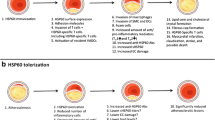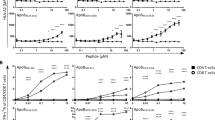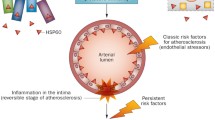Abstract
Previous studies have established that Mycobacterium tuberculosis heat shock protein 65 (mHSP65) plays an important role in immune-associated diseases as an autoimmune factor. Some overlapping epitopes of mHSP65 may serve as initiators of both atherosclerosis and other autoimmune-associated diseases. In the present study, atherosclerosis was significantly enhanced in high-cholesterol diet (HCD)-fed New Zealand white rabbits immunized with mHSP6591–105 compared with PBS-immunized or BSA-immunized rabbits. Immunizing wild-type C57BL/6J mice with mHSP6591–105 induced the aortic endothelial injury. Although western blot demonstrated that specific antibodies against mHSP6591–105 can cross-react with recombinant human heat shock protein 60, specific antibodies against mHSP6591–105 had no direct effects on HUVECs in vitro. Laser scanning confocal microscopy showed that mHSP6591–105 localized in the cytoplasm of HUVECs, even when HUVECs were heat shocked at 42°C. mHSP6591–105-specific splenic cells secreted more IFN-γ than controls. Also, adoptive transfer of mHSP6591–105-specific splenic cells can accelerate atherosclerosis in ldlr −/− mice. We can conclude that the (auto)immune response to mHSP6591–105 accelerates atherosclerosis in animal models, and that the response of Th1 plays an important role in this progress.




Similar content being viewed by others
References
Crisby M, Kublickiene K, Henareh L, Agewall S (2009) Circulating levels of autoantibodies to oxidized low-density lipoprotein and C-reactive protein levels correlate with endothelial function in resistance arteries in men with coronary heart disease. Heart Vessel 24:90–95
Paier A, Agewall S, Kublickiene K (2009) Expression of heat shock proteins and nitrotyrosine in small arteries from patients with coronary heart disease. Heart Vessel 24:260–266
Xu Q (2002) Role of heat shock proteins in atherosclerosis. Arterioscler Thromb Vasc Biol 22:1547–1559
Hansson GK (2009) Inflammatory mechanisms in atherosclerosis. J Thromb Haemost 7(Suppl 1):328–331
Hansson GK (2005) Inflammation, atherosclerosis, and coronary artery disease. N Engl J Med 352:1685–1695
Xu Q, Willeit J, Marosi M, Kleindienst R, Oberhollenzer F, Kiechl S, Stulnig T, Luef G, Wick G (1993) Association of serum antibodies to heat-shock protein 65 with carotid atherosclerosis. Lancet 341:255–259
Zhu J, Katz RJ, Quyyumi AA, Canos DA, Rott D, Csako G, Zalles-Ganley A, Ogunmakinwa J, Wasserman AG, Epstein SE (2004) Association of serum antibodies to heat-shock protein 65 with coronary calcification levels: suggestion of pathogen-triggered autoimmunity in early atherosclerosis. Circulation 109:36–41
Hansson GK (2001) Immune mechanisms in atherosclerosis. Arterioscler Thromb Vasc Biol 21:1876–1890
Mayr M, Kiechl S, Willeit J, Wick G, Xu Q (2000) Infections, immunity, and atherosclerosis: associations of antibodies to Chlamydia pneumoniae, Helicobacter pylori, and cytomegalovirus with immune reactions to heat-shock protein 60 and carotid or femoral atherosclerosis. Circulation 102:833–839
Mallat Z, Taleb S, Ait-Oufella H, Tedgui A (2009) The role of adaptive T cell immunity in atherosclerosis. J Lipid Res 50(Suppl):S364–S369
Foteinos G, Afzal AR, Mandal K, Jahangiri M, Xu Q (2005) Anti-heat shock protein 60 autoantibodies induce atherosclerosis in apolipoprotein E-deficient mice via endothelial damage. Circulation 112:1206–1213
George J, Shoenfeld Y, Afek A, Gilburd B, Keren P, Shaish A, Kopolovic J, Wick G, Harats D (1999) Enhanced fatty streak formation in C57BL/6J mice by immunization with heat shock protein-65. Arterioscler Thromb Vasc Biol 19:505–510
Perschinka H, Mayr M, Millonig G, Mayerl C, van der Zee R, Morrison SG, Morrison RP, Xu Q, Wick G (2003) Cross-reactive B-cell epitopes of microbial and human heat shock protein 60/65 in atherosclerosis. Arterioscler Thromb Vasc Biol 23:1060–1065
Uray K, Hudecz F, Fust G, Prohaszka Z (2003) Comparative analysis of linear antibody epitopes on human and mycobacterial 60-kDa heat shock proteins using samples of healthy blood donors. Int Immunol 15:1229–1236
Metzler B, Schett G, Kleindienst R, van der Zee R, Ottenhoff T, Hajeer A, Bernstein R, Xu Q, Wick G (1997) Epitope specificity of anti-heat shock protein 65/60 serum antibodies in atherosclerosis. Arterioscler Thromb Vasc Biol 17:536–541
Chait A, Han CY, Oram JF, Heinecke JW (2005) Thematic review series: the immune system and atherogenesis. Lipoprotein-associated inflammatory proteins: markers or mediators of cardiovascular disease? J Lipid Res 46:389–403
Durai M, Kim HR, Bala KK, Moudgil KD (2007) T cells against the pathogenic and protective epitopes of heat-shock protein 65 are crossreactive and display functional similarity: novel aspect of regulation of autoimmune arthritis. J Rheumatol 34:2134–2143
Kaplan MJ (2009) Management of cardiovascular disease risk in chronic inflammatory disorders. Nat Rev Rheumatol 5:208–217
Moudgil KD, Chang TT, Eradat H, Chen AM, Gupta RS, Brahn E, Sercarz EE (1997) Diversification of T cell responses to carboxy-terminal determinants within the 65-kD heat-shock protein is involved in regulation of autoimmune arthritis. J Exp Med 185:1307–1316
Kim HR, Kim EY, Cerny J, Moudgil KD (2006) Antibody responses to mycobacterial and self heat shock protein 65 in autoimmune arthritis: epitope specificity and implication in pathogenesis. J Immunol 177:6634–6641
Danieli MG, Markovits D, Gabrielli A, Corvetta A, Giorgi PL, van der Zee R, van Embden JD, Danieli G, Cohen IR (1992) Juvenile rheumatoid arthritis patients manifest immune reactivity to the mycobacterial 65-kDa heat shock protein, to its 180–188 peptide, and to a partially homologous peptide of the proteoglycan link protein. Clin Immunol Immunopathol 64:121–128
Oh SH, Han EC, Lee JH, Bang D (2009) Comparison of the clinical features of recurrent aphthous stomatitis and Behcet’s disease. Clin Exp Dermatol 34(6):e208
Seyahi E, Ugurlu S, Cumali R, Balci H, Ozdemir O, Melikoglu M, Hatemi G, Fresko I, Hamuryudan V, Yurdakul S, Yazici H (2008) Atherosclerosis in Behcet’s syndrome. Semin Arthritis Rheum 38:1–12
Rhee SH, Kim YB, Lee ES (2005) Comparison of Behcet’s disease and recurrent aphthous ulcer according to characteristics of gastrointestinal symptoms. J Korean Med Sci 20:971–976
Hasan A, Shinnick T, Mizushima Y, van der Zee R, Lehner T (2002) Defining a T-cell epitope within HSP 65 in recurrent aphthous stomatitis. Clin Exp Immunol 128:318–325
Uchio E, Stanford M, Hasan A, Satoh S, Ohno S, Shinnick T, van der Zee R, Mizushima Y, Lehner T (1998) HSP-derived peptides inducing uveitis and IgG and IgA antibodies. Exp Eye Res 67:719–727
Reichlin M (1980) Use of glutaraldehyde as a coupling agent for proteins and peptides. Methods Enzymol 70:159–165
Damico RL, Chesley A, Johnston L, Bind EP, Amaro E, Nijmeh J, Karakas B, Welsh L, Pearse DB, Garcia JG, Crow MT (2008) Macrophage migration inhibitory factor governs endothelial cell sensitivity to LPS-induced apoptosis. Am J Respir Cell Mol Biol 39:77–85
Kanwar RK, Kanwar JR, Wang D, Ormrod DJ, Krissansen GW (2001) Temporal expression of heat shock proteins 60 and 70 at lesion-prone sites during atherogenesis in ApoE-deficient mice. Arterioscler Thromb Vasc Biol 21:1991–1997
Schett G, Metzler B, Mayr M, Amberger A, Niederwieser D, Gupta RS, Mizzen L, Xu Q, Wick G (1997) Macrophage-lysis mediated by autoantibodies to heat shock protein 65/60. Atherosclerosis 128:27–38
Williams JM, Colman R, Brookes CJ, Savage CO, Harper L (2005) Anti-endothelial cell antibodies from lupus patients bind to apoptotic endothelial cells promoting macrophage phagocytosis but do not induce apoptosis. Rheumatology (Oxford) 44:879–884
George J (2008) Mechanisms of disease: the evolving role of regulatory T cells in atherosclerosis. Nat Clin Pract Cardiovasc Med 5:531–540
Gotsman I, Sharpe AH, Lichtman AH (2008) T-cell costimulation and coinhibition in atherosclerosis. Circ Res 103:1220–1231
Acknowledgments
This work was supported in part by the China National Natural Science Fund Committee (grant nos. 30500458, 30701023, 30672464, 30872393 and 30772570); the Natural Science Foundation of Jiangsu Province (no. BK 2007170).
Author information
Authors and Affiliations
Corresponding author
Rights and permissions
About this article
Cite this article
Zhang, Y., Xiong, Q., Hu, X. et al. A novel atherogenic epitope from Mycobacterium tuberculosis heat shock protein 65 enhances atherosclerosis in rabbit and LDL receptor-deficient mice. Heart Vessels 27, 411–418 (2012). https://doi.org/10.1007/s00380-011-0183-8
Received:
Accepted:
Published:
Issue Date:
DOI: https://doi.org/10.1007/s00380-011-0183-8




